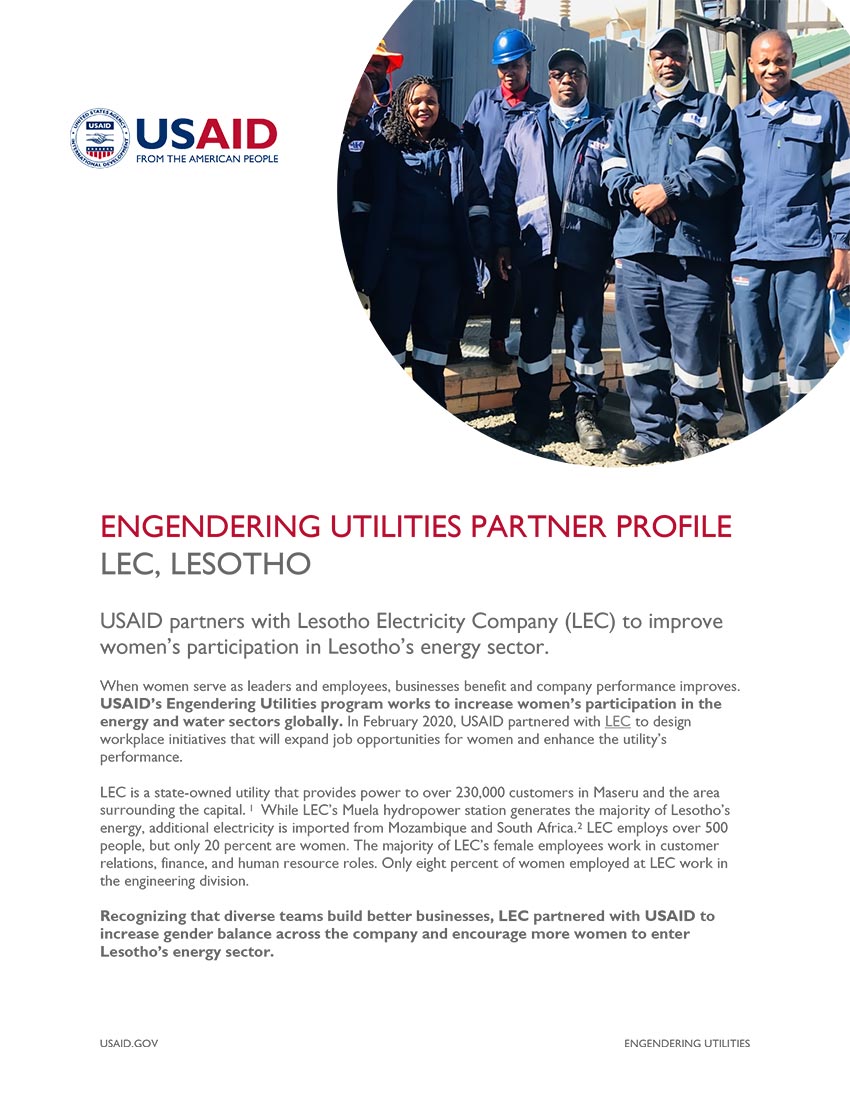- Energy Home
- How We Work
- Programs & Initiatives
- Smart Utilities
- Asia EDGE
- Auction Design Support to Colombia
- Energy Auctions for Kazakhstan’s Green Economy
- Energy Efficiency for Development
- Engendering Utilities
- About
- Business Case
- Approach
- Partners
- OSHEE, Albania
- SONABEL, Burkina Faso
- EDESUR, Dominican Republic
- DELSUR, El Salvador
- EEU, Ethiopia
- Energo-Pro, Georgia
- GRIDCo, Ghana
- BRPL, India
- TPDDL, India
- EDCO, Jordan
- IDECO, Jordan
- Miyahuna, Jordan
- KenGen, Kenya
- Kenya Power
- KOSTT, Kosovo
- LEC, Lesotho
- LEC, Liberia
- EGENCO, Malawi
- EDM, Mozambique
- EKEDC, Nigeria
- IBEDC, Nigeria
- ISWSC, Nigeria
- EVN, North Macedonia
- LASURECO, Philippines
- ZCWD, Philippines
- REG, Rwanda
- OFOR, Senegal
- Senelec, Senegal
- EVN, Vietnam
- Resources
- Stories
- Institutional Framework for Auctions in Mexico
- Powering Agriculture
- The USAID-NREL Partnership
- Scaling Up Renewable Energy
- EmPOWERing Women and Girls
- Competitive Energy Procurement
- Toolkits
- Monitoring & Evaluation
- Resources
- Stories
Speeches Shim
Engendering Utilities Partner Profile
LEC is a state-owned utility that provides power to over 230,000 customers in Maseru and the area surrounding the capital. LEC employs over 500 people, of which 20 percent are women.
Over 70 percent of the urban population of Lesotho has access to electricity, but only 20 percent of the rural population has power. LEC’s Muela hydroelectric power station generates most of Lesotho’s electricity, but demand for power outpaces production, requiring Lesotho to import approximately 35 percent of its electricity. In 2003, the Government of Lesotho developed an energy policy which outlines the country’s goals for expanding access to renewable energy, especially in rural parts of the country. Engendering Utilities’ work with LEC will ensure women can capitalize on growing opportunities in Lesotho’s energy sector.
A complex web of contributing factors prevents women in Lesotho from joining the formal workforce, particularly the male-dominated energy sector. Lesotho has the world’s most extreme gender disparity in education, with more girls enrolled than boys. This is fueled by poverty and unemployment which causes significant numbers of boys and men to migrate out of the country, as well as the expectation that boys will withdraw from school to support cattle-raising. There are 1.6 girls for every boy enrolled in secondary school in the country, and more girls than boys enroll in tertiary programs. While more girls attend college than boys, they make up only 23 percent of graduates in STEM-related fields. Engendering Utilities is supporting LEC to consider and respond to factors that reduce women’s workforce participation by building inclusive policies and practices that benefit men, women, and businesses in the energy sector.
USAID is supporting LEC in its goal of increasing gender equality across the company’s business practices by providing change management coaching and leadership training, conducting a baseline assessment to identify gaps and opportunities for gender equality, and developing a strategic plan with LEC to facilitate the company’s gender equality goals.
USAID will support and accelerate gender equality initiatives at LEC as part of the broader strategic action plan, including:
- Developing a Full Suite of Gender Equitable HR Policies, including a gender policy, an equal employment opportunity statement, and a comprehensive sexual harassment policy.
- Strengthening Outreach to Vocational Schools to increase recruitment of women and hire more female electricians.
- Committing to Gender Equality as a Strategic Objective, including formalizing concrete action plans and policies to mainstream gender equality across the utility’s business practices.


Comment
Make a general inquiry or suggest an improvement.